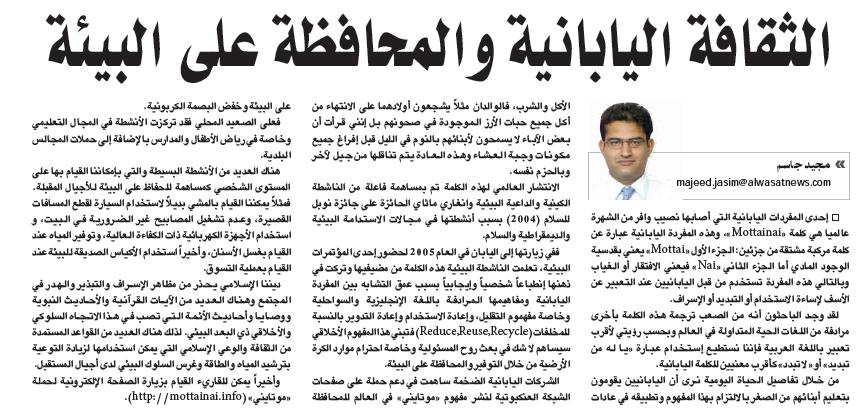|
Japanese Culture and Environment Conservation Dr. Majeed Jasim One of the Japanese vocabularies that got world-wide attention and became famous is the word “Mottainai”. This Japanese word is made up of two parts: the first part “Mottai” means intrinsic dignity while “Nai” means absence or lack thus this word to Japanese implies regret concerning waste. Researchers found that it is difficult to translate this word exactly to other alive languages and according to my nearest translation to Arabic it means “La Tubaded” or “Do not waste”. From the details from the daily life, we see the Japanese teach their children from early age to apply this principle in their eating and drinking habits. For example, the parents encourage their children to finish off all the rice grains in their plates before going to sleep. Even I read that some parents do not accept that their children go to sleep before finishing off what is on their dinner plates. The world wide diffusion of this word has been possible with the assistant of Kenyan activist and Environmentalist lobbyist Wangare Maathai who won the peace Noble prize in 2004. In her visit to Japan in 2005 to attend one of the conferences, the activist learned this word from her host and it left positive reflection in her mind because of similarity of meaning Japanese word with the English and Swahili meaning specially the 3R’s (Reduce, Reuse, Recycle) as understand the moral meaning would contribute to respect Earth resources through conservation and saving. The big Japanese companies contributed and supported the global widespread and understand of the word “Mottainai” to conserve environment and reduce carbon footprint. In the local arena, the activities concentrated on education specially in kindergarten and school levels and municipality campaigns. There are lots of simple activities that can be carried out on personal level to conserve environment for future generations. For example,, we can walk instead of driving cars for short distances, switch off un-necessary lights, use high-efficiency electrical appliances, save water when washing teeth, and use eco-friendly bags during shopping. The Islamic religion warned us of showing excess behaviour in society and there are lots of Quranic verses and prophets words that direct us in this path of conservation. Thus, there are lots of rules from Islamic culture and way of life that we can use to save water, energy, and teach good environmental manners for future generations. The reader can visit the “Mottainai” campaign web site (http://mottainai.info/ )
Al Wasat newspaper of February 15 2009
Courtesy of AlWasat Newspaper |
| Copyright(C): 2012 Embassy of Japan in Bahrain |

Embassy of Japan in Bahrain
在バーレーン王国日本国大使館

